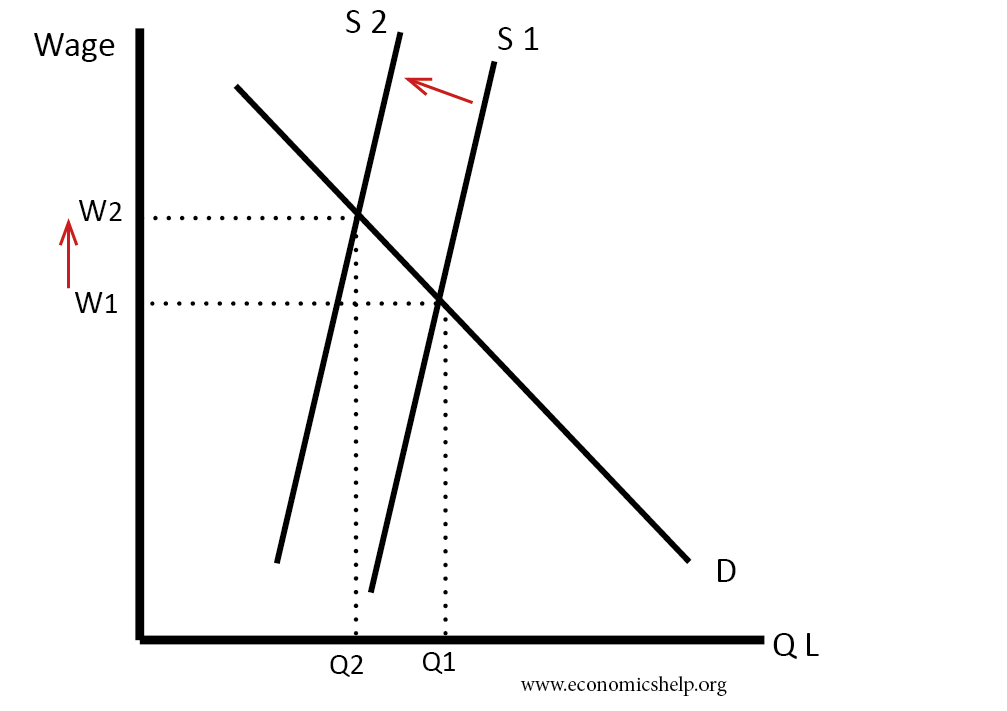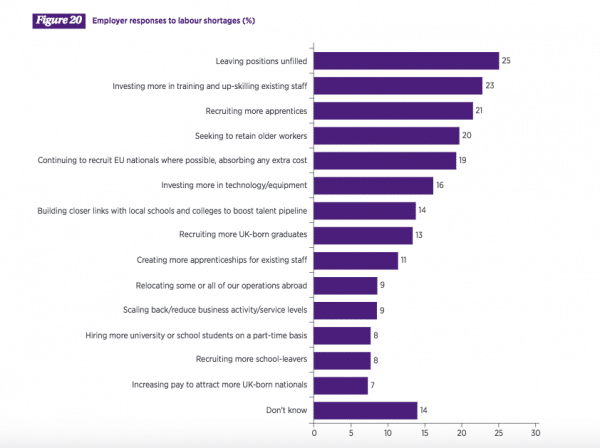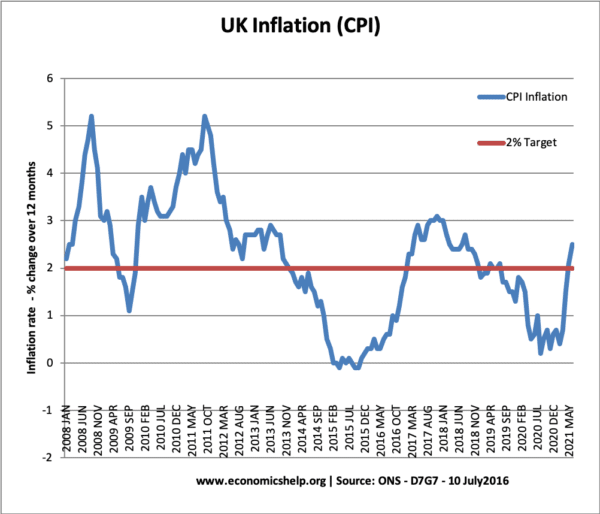Labour shortages occur when employers struggle to fill labour vacancies because of insufficient labour applying for the jobs.
Labour shortages can occur in geographical regions or in occupations with special requirements in terms of skill or function. Labour shortages can also be seasonal in industries like retail (Christmas) and agriculture (harvest time). Recently, since Brexit the UK has experienced significant labour shortages, especially in low-skilled industries. This has led to both advantages – rising wages in some of these industries, and drawbacks – shortage of goods and under-provided services.
Impact of labour shortages – Summary
- Rising wages in competitive industries
- Rising inflation as firms pass wage costs onto consumers
- Higher wages may increase labour supply as it becomes more attractive to work.
- Potentially rising productivity as firms invest more in technology and capital to replace workers
- Firms move production overseas where there is better supply of workers
- Shortage of goods and services
- If migrants leave, this causes a fall in labour supply, but it should also be remembered this will also cause a fall in demand for labour. If workers leave the UK, they will not spend in the UK so there will be lower aggregate demand.
More detail on labour shortages
1. Rising wages
The first economic effect is that if supply of labour falls, we should see rising wages. This is basic supply and demand, and in industries, we quite acute labour shortages, we have seen signficant wage rises. Examples, include lorry drivers, fruit pickers and. It is worth noting in industries with acute labour shortages, firms are to some extent able to pass the higher wage costs on to consumers, in other industries, firms are facing squeezed profit margins.
Fall in supply of labour leads to rising wages
 If supply falls, this puts pressure on wages to rise. The basic economic response to a labour shortage is for firms to increase pay to attract more workers. If you ever wondered why it cost £60-£100 an hour to hire a plumber, it is partly due to the relative shortage of labour. In a free market, we will see higher wages in professions, such as lawyers, where there is a limited supply.
If supply falls, this puts pressure on wages to rise. The basic economic response to a labour shortage is for firms to increase pay to attract more workers. If you ever wondered why it cost £60-£100 an hour to hire a plumber, it is partly due to the relative shortage of labour. In a free market, we will see higher wages in professions, such as lawyers, where there is a limited supply.
However, we also see jobs, which have in the past routinely experienced labour shortages but wages remain close to the national minimum wage. (e.g. food processing, farm worker, care home worker)
Raising pay is only one possible response to labour shortages. Other responses could be
- Leave position unfilled
- Invest more in training/technology
- Recruiting more apprentices (who get lower pay)
- Focus on retainment of staff.

It suggests ‘increasing pay to attract more UK-born nationals’ is quite low down on the list (7%) of possible responses.
Evaluation of higher wages
- It depends on the industry. Farming has very tight margins, and farmers face monopsony buyers (Supermarkets putting pressure on farmers to keep prices low). Supermarkets also have the option of importing food if UK wages do rise. Therefore this makes it harder to put up wages
- In the service sector, some jobs are currently hard to replace with technology, e.g. hairdressing, baristas. Some jobs in manufacturing are easier to replace with increased automation.
- There is a difference between short-term and long-term. In the short-term, employers may leave positions unfilled, but in the long-term, this may be increasingly untenable.
- Monopsony employers. In jobs such as nurses and care workers, the principal employer is the government, therefore wages may not rise due to market pressures because governments are limited by spending limits.
Inflation

Prolonged labour shortages can have an upward effect on wages. Over time, higher wages will start to feed into higher inflation (both cost-push and demand-pull pressures) The impact on inflation depends on:
- How much employers respond to shortages by putting up wages.
- The number of occupations affected by labour shortages and whether there is a knock-on effect to other wages in the economy.
- Other inflationary pressures in the economy.
Labour shortages can increase the tendency for firms to look abroad for willing/skilled workers. If you have a shortage in nursing, it is very difficult to increase UK supply. Even higher wages would have little impact in the short-term. Encouraging migration from other countries is the easiest way to attract nurses to fill immediate shortages.
Shortage of goods/services
There is no guarantee that a shortage of labour will be solved by the free-market. If the economy is close to full employment, even a modest rise in wages may be insufficient to attract workers to the job. For example, wages have risen for meat-processing plants, lorry drivers and fruit pickers, but in the UK, most native born workers do not like the idea of working there. The result is both partial rising wages and prolonged shortages of the good/service. Hence some goods have remained undelivered and there is real concern that care homes will be unable to provide the necessary amount of labour.
Labour shortages – short-term and long-term
Some may argue that migration is a short-term fix to labour shortages. If migration is stopped, it will force an economy to deal with labour shortages by training relevant workers.However, limiting migration may not be enough. Lower levels of migrants don’t necessarily lead to increase in the number of trained nurses, builders and plumbers. There are also structural factors behind why people choose or don’t choose training qualifications. There could also be a period of shortages because it would take time for the labour market and educational institutions to respond to the labour shortages.
Reasons for labour shortages
- Geographical shortages. An area with a booming economy, but poor housing can experience labour shortages quicker than the rest of the economy. In the UK, London has strong employment demand but suffers from high rent costs which make London relatively unattractive to workers, causing labour shortages.
- High skilled jobs. Occupations which require particular skills/qualifications have only a limited pool of workers who can apply. For example, an occupation like doctors/nursing requires a lengthy training period. If there is a shortage, there will be a considerable time lag in training new workers.
- Unattractive jobs. In the service sector or agriculture, there are some jobs which are hard to fill because of non-monetary costs and negative social perceptions about the job. For example, fruit picking – is long hours, repetitive work and exposed to the elements. In a developed economy with high expectations, farmers can struggle to fill these low-paid jobs, which are seen as undesirable.
- Social prestige. Job professions are not just about wages, but the prestige attached. In the UK, there has been a push to increase rates of students studying at university. For many schools and parents, vocational jobs, such as plumbing, electrician and technician are seen as relatively unattractive. The retail sector has a perception it is just a ‘temporary’ job and many want to avoid a career in this sector.
- Fixed pay. Public sector jobs have pay determined by the government and not market forces. For political reasons, the government may implement a prolonged pay freeze – even in public sector occupations where shortages are beginning to show. This is often a problem for an occupation like teaching, which is high-skilled but relatively low paid compared to private sector alternatives.
- Economy at full employment. Labour shortages will be more likely in vulnerable sectors when the macroeconomy is close to full employment.
Related

There is no such thing as a labor shortage in the long run. If a sufficient number of workers cannot be found then the work, apparently, wasn’t worth doing.
Importing workers should not be a resort, first or at all. If the position is not worth enough to justify higher wages it’s not worth doing.
Labour shortage 🙁 no such thing…. We have to look at the reasons as to why no one wants to work, or do that particular job. Easy…benefits, when it’s far easier to get free money without doing anything. This is why companies look to immigrants, a lot use these jobs to earn big money, coming from third world country the wage is more than in their own country, and they use it to send money back home. Accepting lower standard of living (actually it maybe higher in comparison to where they come from: squat bedsit ) for shorter time means they can send more money back home. This money does not end up in our economy, so why encourage immigrants , and give them benefits?
Best way to solve problem, only give min wage and benefits to British citizens.
Also the farmers jobs used to be taken by students, well they get student grants now so no reason to work there.
Benefits and immigrants have screwed the economy, anything that is unlimited is bad!
Half the problem with countries like the UK, Australia, Canada & the US-always looks for the easy neo-liberal option;”Let’s poach other developing countries skilled workers!” a)saves on training costs b)keeps skilled worker’s wages down-this approach no longer works as Asian countries(eg-India & China) now also have emerging economies and will also be offering higher wages to retain their skilled workers home. Also, the UK was poaching skilled tradesmen from Poland in particular-esp-plumbers & electricians for London’s booming building industry. Also the US for years & years was poaching low-skilled Horticulture/Agriculture workers-primarily from Mexico that’s also coming to end now as well, as things in Mexico are getting better(after years of civil unrest) and wages are slowly rising,plus President Trumps new restrictions have seen these virtual “slave” jobs un-filled, unless the wages are put up, but don’t count on cheap Latinos to fill up these rubbish jobs anymore – It’s doubtful these people would ever return to the United States again!
Also, the retiring Baby Boomers are leaving the workforce in droves-I don’t blame them! Unless real wages rise in the near future-the shortages of workers will only become worse!